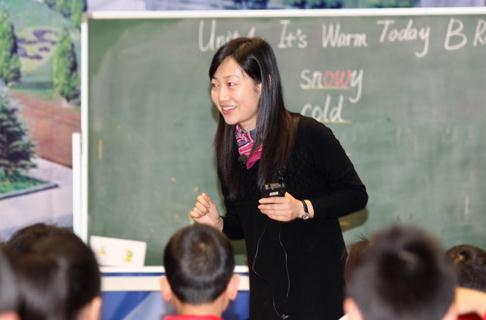|

TESOL国际英语教师:翟佩琪
我在英语学校工作多年,我深知英语学科的重要性,英语老师又是这一学科的灵魂,然而怎样才是好老师?其实没有一个统一的标准,但我把老师分成两种类型,一种是知识型,一种是忽悠型。前者传授知识,但学生并不一定满意。后者主要是哄学生高兴,上课给学生讲自己的经历、故事、笑话、甚至是黄段子。知识传授量少。然而学生当时很满意,事后想想却有一种上当受骗的感觉。下面就这两类英语老师做一个对比:
优秀的英语教师(The Good English Language Teacher)
1、 亲和的(friendly),2、解释事理(explained things),3、提供好的笔记(gave good notes),4、知道如何对付在座位上静坐六小时的学生(knew how to treat someone who sits at a desk for six hours),5、让学生自己处理自己的事情——小组作业(let the students do it by themselves---group work),6、学生一起做功课(we did the lesson together),7、从学生的已知中引出话题[took out (elicited ) things we know],8、谈论自己的生活(talked about her life),9、谈论学校的问题(talked about problems of the school ),10、谈论其他话题(talked about other subjects),11、参加比赛,玩游戏(played games)12、讲笑话(told jokes),13、是学生中的一个(she was one of us),14、不放弃学习困难者(didn’t push weak learners),15、征询学生意见,对话平等(asked students opinions, there was a dialogue),16、长得像演员,会打扮(she was like an actress; pretended a lot),17、强势,但不严厉(she was forceful, but not strict),18、受过良好教育(she was educated),19、懂心理学(she knew psychology),20、做动作辅助解释(used movement to make meaning clear),21、确认每一个学生理解(she made sure everyone understood),22、有情趣(she was funny),23、声情并茂地朗读,促进理解(read in a tone that made meaning clear),24、与学生关系密切(she got close to students),25、信任学生,使学生自信(s he believed in me, made me believe in myself),26、使得学生彼此欣赏(I wanted him to be proud of me),27、有个性风格(she had a personality of her own),28、富有经验(was very experienced),29、讲清语法(she made grammar clear),30、主动交流(they tried to communicate),31、提供建议(she gave advice),32、谈论个人问题(she talked about personal problems),33、提供给学生大量书刊(she gave me a lot of books to read),34、运用问题进行教学(she used questions a lot),35、提问到每一个学生(she asked all students questions),36、社会工作——职业任务之一(social work---it was their job)。
差劲的英语教师(The Bad Language Teacher)
1、非常严厉(very strict),2、不允许学生讲话(didn’t let us speak),3、指定文本学习,然后检查(gave us a text to learn and checked it),4、一直在做记号(gave marks all the time),5、坐在椅子上讲课(she was fixed in a chair),6、总是掌势支配学生[always above our heads (dominates)],7、无事大呼大叫(shouted for no reason),8、测试次数很多(gave a lot of tests),9、迫使学生做事(forced us to do things),10、不讨论其他问题(didn’t discuss other problems),11、直接进入教学(started a lesson immediately),12、没有笑脸(didn’t smile),13、盯视学生,吓得孩子有话不敢言(she stared at you and you couldn’t say a word even if you wanted to),14、试题太难(his tests were too difficult),15、学生备考不充分(we were not prepared for the test),16、演示语法规则,学生一看就忘(he just showed us a grammar rule and we forgot it),17、夸张学生的错误(shouted when we made mistakes),18、非常紧张、脾气坏[very nervous(bad tempered),19、反复唠叨(talked and talked),20、语调平淡乏味(she spoke flat),21、除了上课还是上课(she just said the lesson and nothing else),22、与学生有距离(there was a distance from us),23、以为所有的学生都是一样的(believed the students were all the same),24、像一台机器(like a machine),25、备课不充分(not prepared),26、对待学生像物体(treated kids like objects),27、刻板(she was rigid)28、热潮冷风(sarcastic and ironic),29、讲课不讨论(only lessons---didn’t discuss anything),30、不回应学生问题(avoided answering questions),31、不拘言笑(you couldn’t laugh, you couldn’t speak),32、老师是老师,学生是学生(he was the teacher, I was the student),33、编造黑名单,,总是指责:“你!你!你!”(he had a blacklist and said, “you, you ,you”),34、带一本夹书签的小书(she had a little book with the marks in),35、不交流,与学生没有来往(no communication, nothing),36、让学生紧张(she made me feel nervous),37、批评学生没有课前作好充分准备(he said we weren’t well prepared)。
通过以上的对比,我将我对好英语老师的观点总结如下::
1、使所有学生整堂课从始至终不走神。
要知道如果学生上课走神,不是学生的错,而是老师讲课内容的吸引力不够,趣味性不够。为什么听李敖的讲座和李阳的疯狂英语就没有一个走神的?老师上课要关注每个学生,学会用眼神交流。控制好课堂气氛,要既有民主,又有集中。
2、 使学生对科目产生兴趣,比传授多少知识量都更重要。很多老师只注重知识量和分数,大量的让学生做题会使他们失去兴趣。比如英语,没有谁爱做题,但谁都爱听英语故事,所以推荐一些好的英文读物,再提出些有争议的问题,让学生自己查资料、查字典,使他们潜移默化的爱上英语,单词量提高了,分数当然也是水涨船高。我最欣赏“润物细无声”的方式。
3、教学内容源于课本,高于课本,基本训练和拓展内容配比合理。
老师不要一味的为了炫耀自己,把拓展的内容讲的太多、太深。那样,大多数学生会觉得太难,进而对课程失去了兴趣。一旦学生对课程没了兴趣,老师等于毁了学生在这门科目上的潜力。课堂只拓展重点内容,以便加深学生的理解和记忆,不能天马行空。
4、最大限度的减少学生课后的压力。
当今的学生,学校作业和各种学习的压力、负担已经很重了,我们的老师不应该再对他们说“课后要如何如何……”,而应该说“课后不用再看书了,该掌握的内容课上大家已经掌握了。”课上尽量把该背、该练的内容完成。
5、给学生要留作业要分A、B、C级,不能一刀切
好的老师应该把作业分级,让优秀学生只做A类难题,一般学生做B类中等题目,差一点的做C类基训题,这样既可以减轻学生作业压力,也可以鼓励每一个层面的学生都向更高的层面进步。
(未经许可,不得转载)
|
 皖公网安备 34020202000625号
皖公网安备 34020202000625号